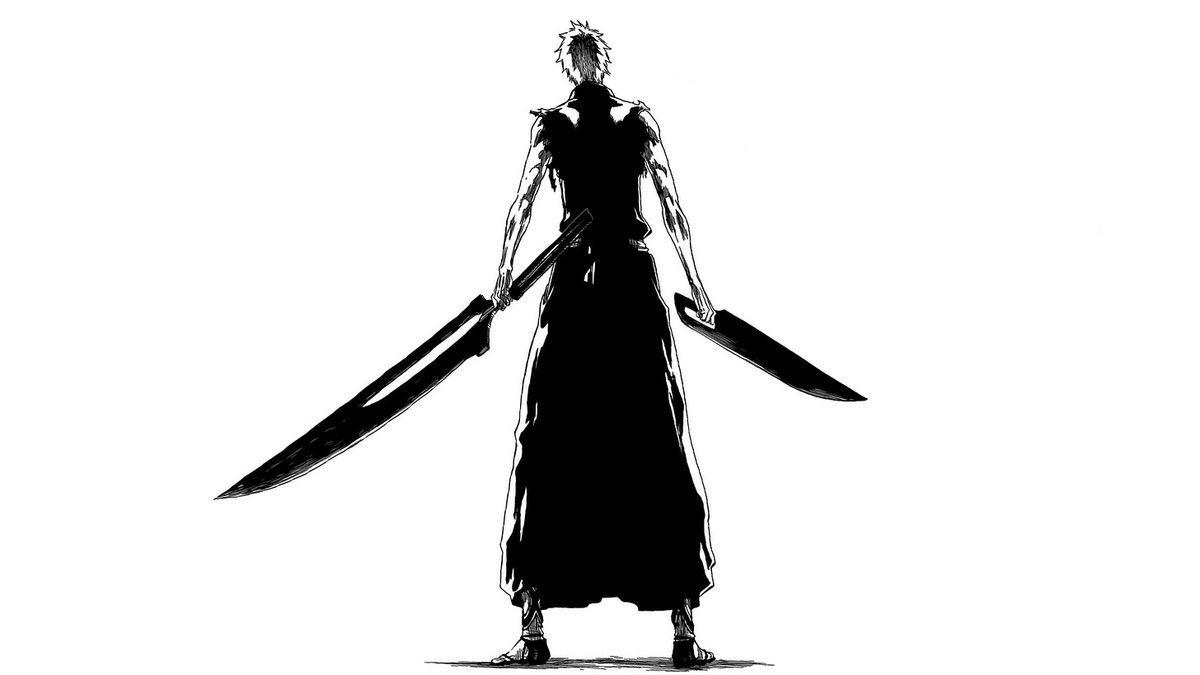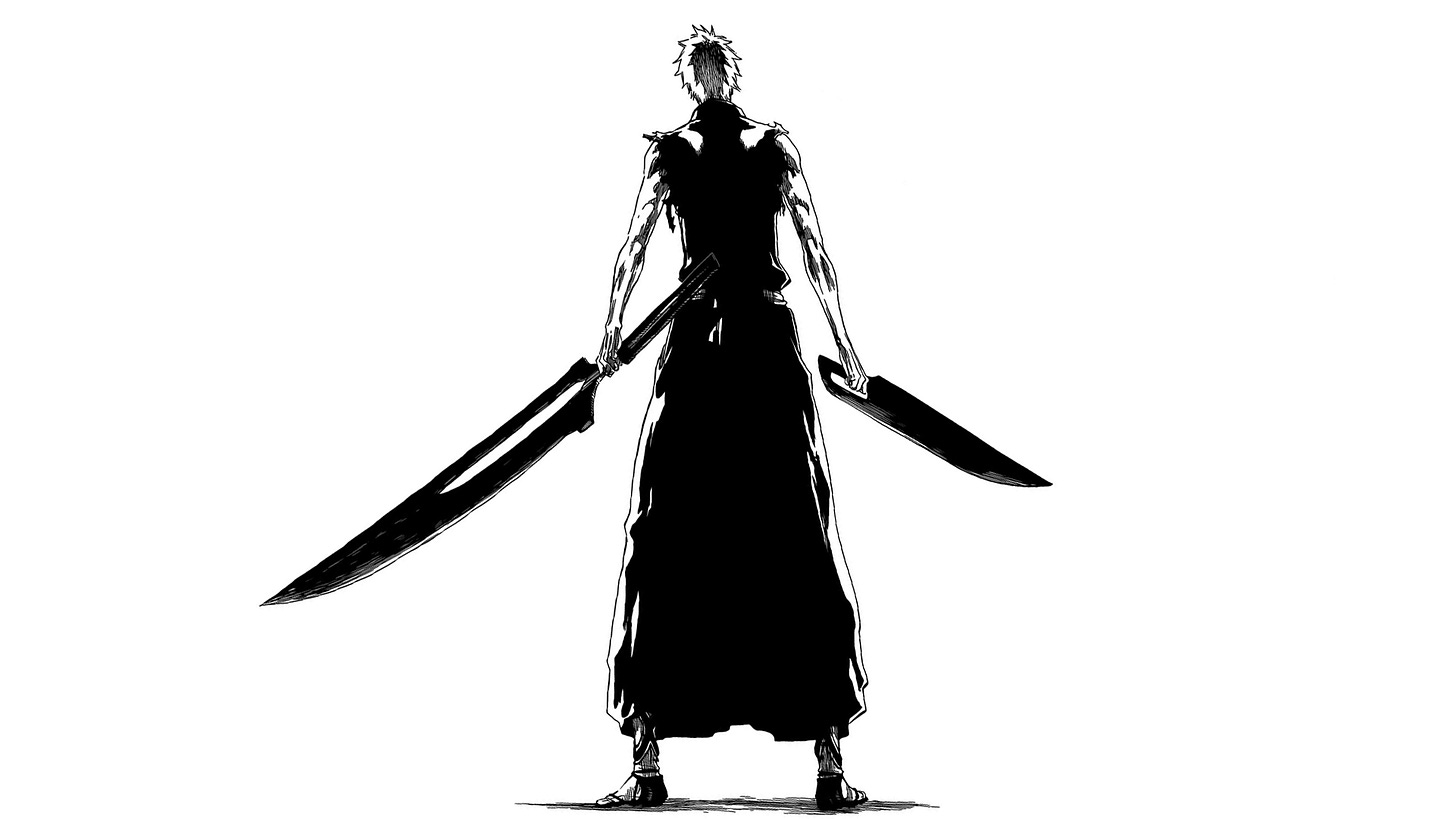The Shadow, Part I
Bleach and the animalistic nature of man.

Fiction is a weird piece of truth. It isn't exactly true in the sense that it happened, it's true in the sense that it depicts an extraction of the meta-truth of life itself. That's because a good piece of fiction is life, but exaggerated. It is more real than real life itself, maybe because the truth is magnified, like when a ray of light becomes too bright, we can't exactly see it because it blinds us. We aren't supposed to see it, but rather feel it. This is what fiction does to us, we can't see the truth but feel parts of it that appeal to us deeply and instinctually, almost inarticulable and maybe for a good reason. Maybe to articulate it would also mean reducing it down to something that's a shadow of its former self.
One such piece of fiction is Bleach.
I remember when I was a little kid ( I still am mentally ), I watched this one scene which deeply appealed to me for some reason. It was when Ichigo (the protagonist) was in conversation with his hollow self, his animalistic self. This is what he said.
"Ichigo, what's the difference between a king and his horse? I don't mean kiddy shit like "One's a person and one's an animal" or "One has two legs and one has four." If their form, ability and power were exactly the same, why is it that one becomes the king and controls the battle, while the other becomes the horse and carries the king?! There's only one answer. Instinct! In order for identical beings to get stronger and gain the power they need to become king, they must search for more battles and power! They thirst for battle, and live to mercilessly, crush, shred, and slice their enemies! Deep, deep within our body lies the honed instinct to kill, and slaughter our enemies! But you don't have that! You don't have those pure, base instincts! You fight with your brain. You try to defeat your enemies with logic! And it doesn't work! You're trying to cut them with a sheathed sword! That's why you're weaker than me, Ichigo! "
Although I didn't understand back then what exactly about it appealed to me but I know that it did. But now, years later, I figured it out to some extent. Ichigo's hollow talked about the same thing that Carl Jung conceptualised as the Shadow. The shadow is a human's dark side, an animalistic side, a blind spot for all intents and purposes. It was the hollow within Ichigo.
In dialogue with Ichigo, hollow explained what truly sets apart the competent and the incompetent is their killer instinct, instincts that reside deep within, almost repressed, in the form of the shadow. The competent reach these deep, dark places within them through introspection and confront them. They accept the dark within them, integrate it into their personality(although it's more like a realisation) and bring it under control. But they must do so voluntarily for it could swallow the person until there is no shred of light remaining within that person.

The shadow has been explored throughout Bleach, Kenpachi, for example, is one such character who has not only confronted his shadow but is comfortable with it. He often fights for the thrill of it. He doesn't really care if there is a reason, emphasizing the fact that he cuts his opponents open for enjoyment, nothing else. Suggesting that sanity is a useless thing that needs to be discarded. Telling Ichigo that human beings crave power and that it isn't unnatural.
When I say power, I don't mean tyranny, I mean competence. Every competent man wants to test his competence and measure it against others. This leads to a thirst for a metaphorical battle. Which is what the hollow was trying to tell Ichigo and complaining that he isn't going to play horse to a king that doesn't even know himself, a king that is incompetent and weak.
This is a common trope, the hero has darkness inside of him. On his quest for power and competence, he has to confront the darkness in him and bring it under control which gives him an edge. The hero has experienced instances in which he let his shadow lose and in the process of that, he lost his mind. The hero never wants to go berserk like that, for he could destroy the very thing that he intended to protect. Which is why awareness of yourself and control of your shadow is so important.
The hero is someone that has subjugated his shadow, the villain is someone that has submitted to his shadow. This distinction is very important.
Carl Jung knew about this. This is why he said
“Until you make the unconscious conscious, it will direct your life and you will call it fate.”
Now how do you confront the shadow and integrate it into your personality?
This will be explored in the part 2 coming next week.
See you next time!
P.S :- I’m experimenting with multi-part series, hope this turns out well.